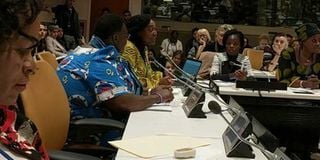Campaigners take on US embassies for denying women visas

FEMNET chairperson Emma Kaliya (second left) addresses a forum on empowerment of young women and girls, at the sidelines of the gender conference at the UN headquarters in New York, on Monday. The chair next to her has been left empty, to signify absence of Editar Ochieng, a fiery young woman activist from Nairobi's Kibera slums. She was denied a US Visa to attend the high profile Commission on the Status of Women. PHOTO | NJERI RUGENE | NATION MEDIA GROUP
In New York,
Women rights campaigners and activists kicked off a protest campaign, ahead of the official opening of the largest gender equality gathering at the UN headquarters in New York, to complain about what they say is a deliberate denial of travel visas especially to young women and those living in the rural areas, mainly in Africa, who had been slated to attend the two-week high profile Commission on the Status of Women.
Led by the African Women’s Development and Communications Network (Femnet) and CIVICUS, they said it was intriguing that most of the women denied visas were funded by different organisations to travel and even participate at the 62nd session of the conference which started Sunday.
This year’s conference has and was expected to have an unprecedented number of women leaders, many of and them youthful activists and women from the rural areas.
This, given that the discussions at the forum are expected to revolve around the conference’s theme on “challenges and opportunities in achieving gender equality and empowerment of rural women and girls.
The hundreds of participants are also set to discuss and come up with recommendations on the participation and access of women to the media and information, communications technologies and the impact on and use of as an instrument for advancement and empowerment of women.
On Monday, the campaigners were drawing up strategies for protesting the “exclusionary practice of visa denial by the US government ahead of the CSW62’’ to the women from various countries which they were putting together in the morning, at the sidelines of the official opening of the conference.
In addition to creating hashtags #SheDefends, #GenderJusticeWithoutBorders and #LeaveNoOneBehind, Monday, those behind the campaign called upon women rights movements and activists to present “a united and strong voice’’ against the visa denial.
“We have noted with much dissatisfaction that various US embassies have often without giving reason, denied visas to young women, women rights defenders and women living in rural areas, many of whom have been selected to attend the CSW62 in New York,’’ said a statement by Femnet and CIVICUS, Monday morning.
During discussions on the issue at a Women Rights Caucus meeting at Fordham Law School leaders of some of the organisations whose members were denied visas argued that the applicants “often’’ have been denied visas “based on harmful perceptions and stereotypes due to their age, marital status, and perceived socio-economic standing and whether live in the rural or urban areas.’’
“Young unmarried women especially who are a tremendous galvanising within rights movement face the near impossible task of securing a United States visa that if granted, would enable them to bring to the foyer pertinent discussions around the state of gender equality globally,’’ the statement calling for action said.
The women described the visa denial as “an attack on the feminist movement.’’
Ms Memory Kachambwa, Femnet’s Programme Manager, said most of those denied visas and who had been funded by the organization in Nairobi were young women activists. Other officials gave names of activists from Zimbabwe, and Cameroon and Asia.
Ms Nyaradzayi Gumbonzvanda, African Union’s Goodwill Ambassador on Ending Child Marriage and chief executive of Rozaria Memorial Trust said, “many people in Africa are angry, we worked so hard to get young women activists and women living in the rural areas to come here and speak out about their situation, only to face this exclusion even when they were funded.’’
She attributed this to a perception “that there is extreme poverty in the rural areas and lack of education.’’
To bring the attention to the issue of visa denial, the campaigners resolved to “create a disruptive movement against exclusionary practices’’ by among others, writing an open letter to all United Nations member states attending the conference on the matter.
The matter would also be raised at a meeting with the US mission to the UN as well as with the secretariat of the 62nd session of the Commission on the Status of Women, it’s secretariat and bureau as well the UN Women.
“We will state categorically that the barriers faced in women accessing visas to CSW62 is part of a bigger and wider problem on restricting movement of women and a clear violation of women’s rights as enshrined in the Beijing Declaration,’’ said the Femnet and CIVICUS statement.
The campaigners would document the numbers of visas denied “without clear cause and the manner in which applicants were and have been denied visas based on harmful assumptions.’’
They also resolved to create an active online campaign that would include showing “all the empty seats’’ at the conference, “where the women human rights defenders should have been.’’





